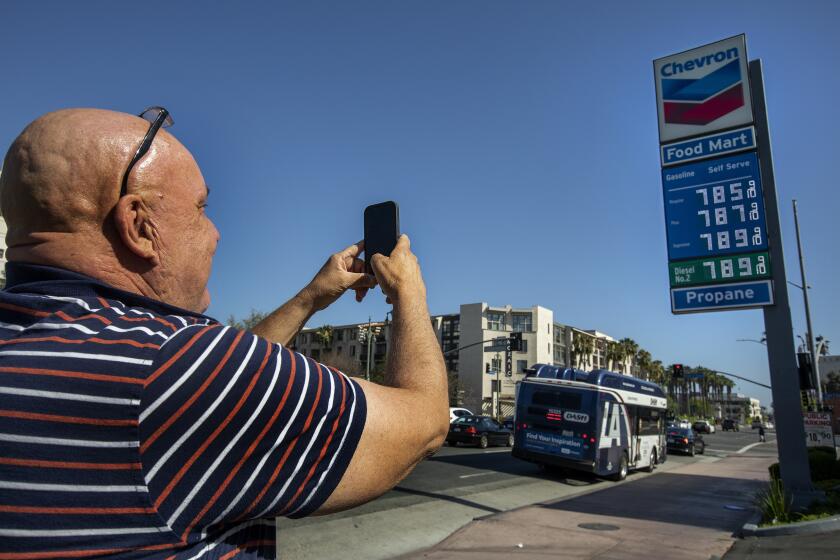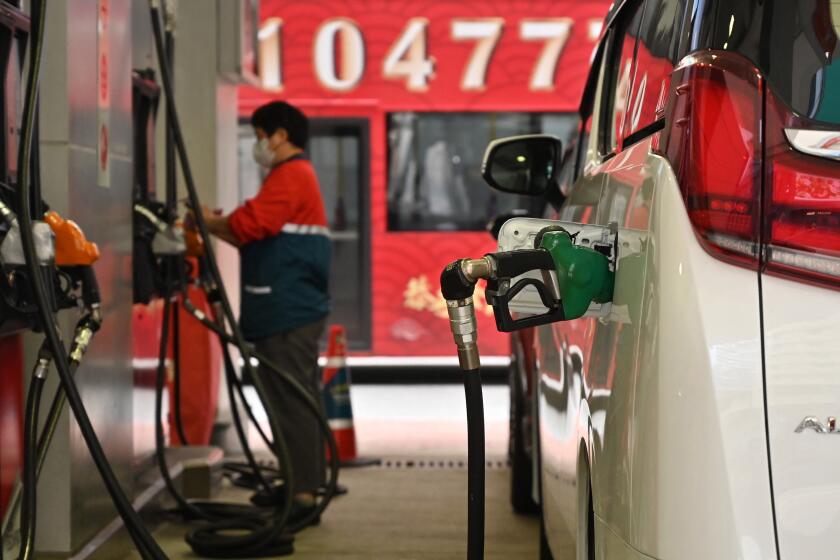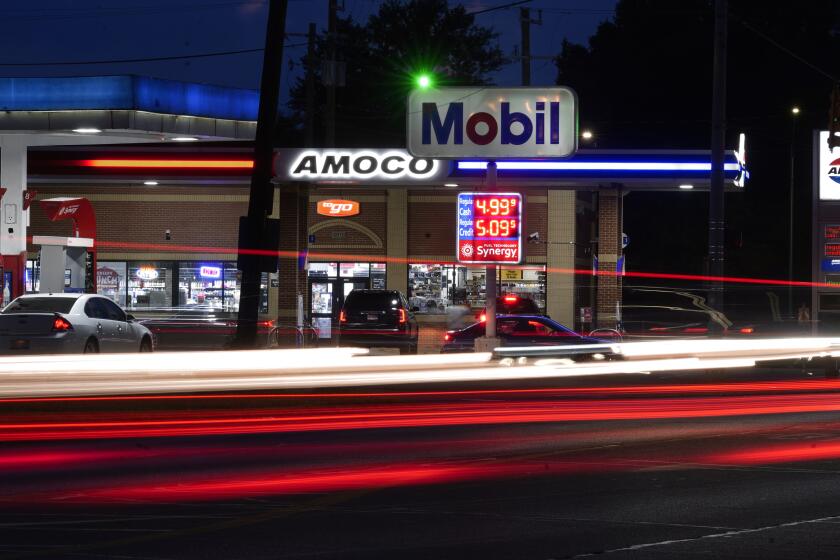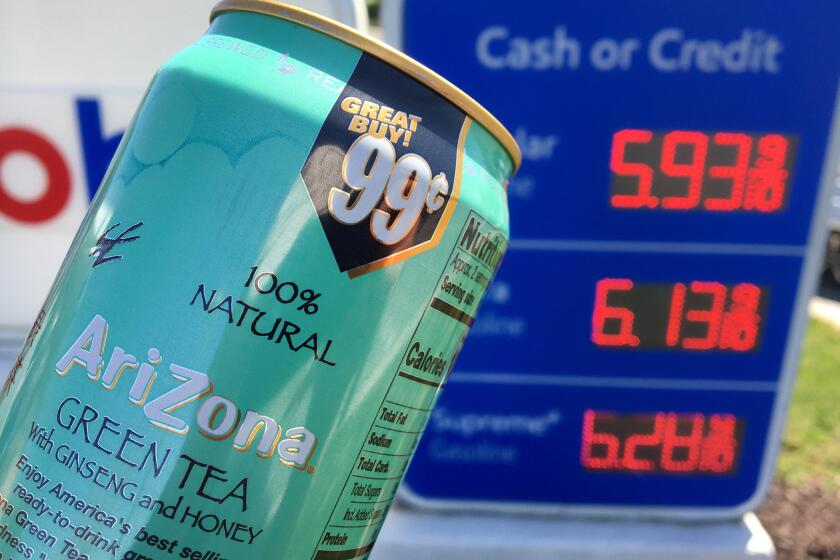Gas used to cost less than bottled water in the United Arab Emirates. Now there’s a reckoning
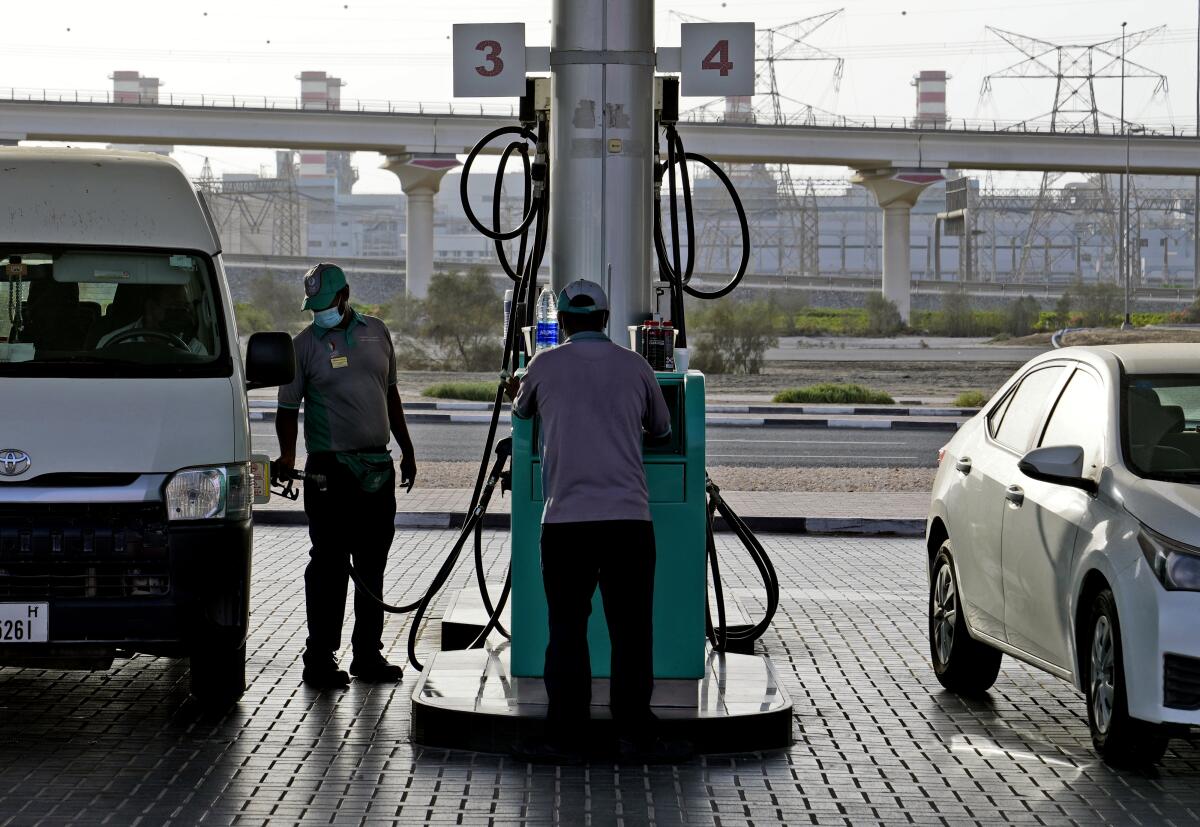
- Share via
DUBAI — Mere years ago, fuel was cheaper than bottled water in the oil-rich United Arab Emirates. Now, long lines snake outside gas stations on the eve of price hikes each month.
Fuel prices in the major OPEC producer, set in line with global oil price benchmarks, have soared more than 70% since Russia’s invasion of Ukraine, accentuating differences with neighboring petro-states that heavily subsidize gasoline.
The contrast has stoked complaints among Emiratis, who receive far better welfare benefits than in most nations, and prompted the government to boost social spending for low-income citizens.
The UAE’s relaxing of fuel subsidies in 2015, which had been costing the government billions of dollars, put the country at the forefront of long-delayed fiscal reforms in the region as oil prices slumped. Even now, gulf Arab rulers getting a windfall from sky-high oil prices know it can’t last forever, as the world’s economies move away from fossil fuels.
“The UAE is really standing out,” said Monica Malik, chief economist at Abu Dhabi Commercial Bank.
At about $4.66 a gallon after July’s price rise, the unprecedented fuel cost in the UAE remains below the records reached in the U.S. and Britain as the war in Ukraine unleashes the biggest commodity shock in decades. But the citizens of this region have long considered cheap fuel a birthright. In Kuwait, the cost of state-subsidized gas is almost four times less.
Gas across the nation dropped to the lowest point in the last month, with the average price of regular fuel at $4.67. In California, gas remains the highest at $6.088.
“Everyone is complaining,” said Emirati engineer Suhail Bastaki. “It’s just too expensive.”
Unlike for the rest of the world, the war in Ukraine has given an unexpected boost to public finances for the UAE and its hydrocarbon-dependent neighbors. With the most diversified economy in the region, Dubai has also benefited from an influx of wealthy Russians since the war.
But the recent gas price surge in the UAE has signaled that the region is not immune to global market forces.
As pressure mounted last week, the UAE and Saudi Arabia allotted a combined $13 billion in social spending for low-income citizens — an option clearly unavailable to the region’s less-affluent economies such as Egypt and Lebanon, where the price of bread is surging and hunger is spreading.
Everyone is paying more for gas, but the U.S. remains the cheapest among advanced nations because of low taxes.
Still, in the UAE, where expatriates outnumber locals nearly 9 to 1, fuel price hikes are costliest for the legions of workers from Africa, the Middle East and South Asia who power the economy.
Inflation has cut into laborers’ meager salaries, triggering a rare outburst of illegal strikes this spring.
Other gulf Arab countries have also curbed state benefits to balance their budgets in recent years. But fearing a backlash from angry consumers, none has gone as far as the UAE, where fuel prices are nearly double the average among gulf Arab states.
The country can get away with this partly because the burden falls on its 9 million expat residents, experts say. Meanwhile, in Saudi Arabia — a country of 35 million, two-thirds of whom are citizens — the government’s fuel price cap has kept inflation under control even as food costs have surged.
“The impact is not really on the [UAE’s] local population,” said Nasser Saidi, an economist in Dubai. “They feel the fuel price increases, but they remain protected in terms of the social contract.”
In first trip to the Middle East as president, Biden faces tough talks on Iran, oil and security.
The tiny Emirati population benefits from a government that provides free education, healthcare and housing, grants for marriage, scholarships to foreign universities and well-paid government jobs.
That contract emerged across the region as rulers cashed in from the oil boom and distributed some of the bounty to citizens in exchange for political loyalty.
In times of windfall — and of discontent — governments know what to do: spread the wealth. International benchmark Brent crude has surged some 50% to more than $100 a barrel since sanctions on Russia stoked fears of shortages.
“The outlays are a recognition that citizens know oil revenues are really high right now,” said Karen Young, a senior fellow at the Washington-based Middle East Institute. “This is a traditional mechanism of sharing.”
Breaking News
Get breaking news, investigations, analysis and more signature journalism from the Los Angeles Times in your inbox.
You may occasionally receive promotional content from the Los Angeles Times.
After the UAE’s latest fuel price rise, grumbling among Emiratis on social media and at traditional meeting spaces grew louder.
“People were suffering,” said Emirati social media influencer Hassan Amiri. “People think Emiratis are filthy rich, but I don’t have an oil rig. Our needs are increasing.”
The grievances escalated to President Sheikh Mohammed bin Zayed Al Nahyan’s weekly majlis, a gathering at which any citizen may apply to voice concerns, said Emirati political expert Majed Raeesi.
Last week, Mohammed unveiled plans to double the state’s social support for low-income Emirati families — classified as those who make less than $6,800 a month. The $7.6-billion package will cover 85% of recent fuel price hikes and 75% of food inflation, and such things as housing allowances and support for job seekers.
Americans are driving less, resulting in fewer greenhouse gas emissions that cause climate change, but at a big cost to poor people.
The government portal received so many applications that it crashed.
“The leadership listened to the streets,” said Amiri, who faced some backlash from Emiratis online over his complaints. Citizens are careful about expressing public criticism lest it be taken for outlawed dissent.
But that help will not reach those who need it most. Desperation over the cost of living is growing among the region’s low-paid migrant workers.
Uber drivers and food-delivery riders who pay for their own fuel in Dubai say they’re barely breaking even. Riders for two main delivery companies went on strike over their slim salaries in May — defying the UAE’s ban on labor protests.
Tall cans of AriZona iced tea have cost 99 cents since 1992. The family behind the company says it’s committed to that price even as the prices of aluminum and corn syrup climb higher.
Uber said it would raise fares as much as 11% for some trips to account for new gas fees in Dubai, but some drivers say that’s inadequate.
A 38-year-old Uber driver from Nigeria was drawn to Dubai 12 years ago by the prospect of good pay. But now he has little to send home to his wife and newborn daughter.
“I can’t stay here anymore,” he said, giving only his first name, Muhammed, for fear of reprisal. “I work in Dubai 12 years and I have nothing.”
More to Read
Sign up for Essential California
The most important California stories and recommendations in your inbox every morning.
You may occasionally receive promotional content from the Los Angeles Times.
